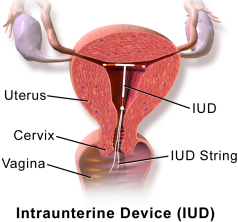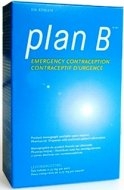There are countless situations where an unplanned pregnancy would be a major problem rather than a pleasant surprise, but there are also countless effective and accessible methods of birth control available across Ontario. Read on to get more information about common forms of birth control, their level of effectiveness, and how you can attain them.
IUD (Intrauterine device)

An IUD is inserted into the uterus through the cervix by a nurse or doctor during a routine physical. In Ontario, it costs about
$90 - $160 and provides up to 5 years of contraception. The copper IUD is a non-hormonal form of birth control that consists of a small, T-shaped device that changes the chemistry in the uterus so that sperm cannot survive. Hormonal IUDs such as Mirena release
levonorgestrel, a hormone that is commonly used in birth control pills, into the uterus so that just small amounts of the hormone enter the bloodstream. IUDs have been proven to be over 99% effective, but they do not protect against STIs or HIV.
Oral Contraceptives (Birth Control Pill)
Oral contraceptives are a widely used form of birth control that must be taken at the same time everyday in order to be effective in preventing pregnancy. You may take combined birth control pills that include two hormones,
progestin and
estrogen, or progestin-only pills. They come in either 21 or 28-day pill packs, and for days where the hormonal pill is not required, each pack contains sugar pills so that you can maintain your routine and remember to take your pill everyday. They are about 92% effective at preventing pregnancy in “
typical use”, taking into account that many women miss a day or two at some point. With perfect use, they are 99% effective in preventing pregnancy.
The price of birth control pills varies in Ontario between $15 and $50 depending on the brand you choose, but they can be obtained at a reduced price at sexual health clinics like Planned Parenthood.
Contraceptive Injections

If you find that you are frequently forgetting to take your birth control pill, you may talk to your doctor about contraceptive injections. In this method, progestin is injected every 12 weeks by a healthcare professional in order to prevent pregnancy. This method is 97% effective in preventing pregnancy as long as you are consistent and continue to receive an injection every 12 weeks. When purchased from pharmacies in Ontario, the contents of each injection usually costs about $40.
Contraceptive sponge

A contraceptive sponges is a soft circular sponge that contains spermicide and is inserted into the vagina, covering the cervix in order to prevent pregnancy. The sponge is 90% effective, there is no prescription or doctor's appointment required, and it is hormone-free. You can purchase it from any Shoppers Drug Mart in Ontario and insert it yourself. They are about $19 for a box of 3, and each sponge is disposable.
The sponge is effective immediately after insertion, and should remain in the vagina for
6 hours after sex. Because spermicide can cause irritation, some women find that they experience yeast infections, bacterial vaginosis, or UTIs as a result of the sponge, especially if it's left in the vagina for too long. It is recommended that you leave the sponge in place for no more than 30 hours to prevent irritation and TSS (toxic shock syndrome).
Condoms
Male condoms are 98% effective at preventing pregnancy with perfect use every time you have sex. However, many people fail to use a condom every single time or make errors while putting the condom on. So, after taking imperfections into account, condoms are realistically about 82% effective in preventing pregnancy when it is the only form of birth control used.
Condoms are also the
only form of birth control that are effective in preventing STIs, and assuming that there is no breakage (which is a rare occurrence), they are extremely effective in doing so. However, condoms might not cover all areas of infection and are not full-proof in protecting against STIs that are transmitted by skin-to-skin contact, such as genital herpes. Condoms are available at any grocery, convenience, or drug store and are usually $12 or under. It's fairly easy to obtain condoms for free at sexual health clinics and most University health care centres.

Emergency Contraceptive Pill (“Plan B”)
If you have had unprotected sex, you may obtain emergency contraception from any drug store or pharmacy in Ontario. Plan B does not require a prescription and costs approximately $40 - in some cases it is even covered by health insurance plans. It should be taken within 3 days of unprotected sex to be effective, and the sooner you take it, the more effective it will be. Depending on how long after sex you wait to take plan B, pregnancy is prevented by either stopping the release of an egg from the ovary, preventing fertilization of the egg, or preventing an egg that has already been fertilized from attaching to the uterus.
Emergency contraception is
not synonymous to abortion – it does not terminate a pregnancy, it prevents pregnancy from occurring. Fortunately, you can prevent the need for Plan B by practicing safe sex and taking measures to prevent pregnancy before intercourse.
Even when you are using an alternative form of birth control, you should be using a condom at every sexual encounter if you are not in a monogamous relationship in order to prevent STIs. Sexual health is important, and everyone should take steps to protect themselves for their physical and mental wellbeing.

 An IUD is inserted into the uterus through the cervix by a nurse or doctor during a routine physical. In Ontario, it costs about $90 - $160 and provides up to 5 years of contraception. The copper IUD is a non-hormonal form of birth control that consists of a small, T-shaped device that changes the chemistry in the uterus so that sperm cannot survive. Hormonal IUDs such as Mirena release levonorgestrel, a hormone that is commonly used in birth control pills, into the uterus so that just small amounts of the hormone enter the bloodstream. IUDs have been proven to be over 99% effective, but they do not protect against STIs or HIV.
An IUD is inserted into the uterus through the cervix by a nurse or doctor during a routine physical. In Ontario, it costs about $90 - $160 and provides up to 5 years of contraception. The copper IUD is a non-hormonal form of birth control that consists of a small, T-shaped device that changes the chemistry in the uterus so that sperm cannot survive. Hormonal IUDs such as Mirena release levonorgestrel, a hormone that is commonly used in birth control pills, into the uterus so that just small amounts of the hormone enter the bloodstream. IUDs have been proven to be over 99% effective, but they do not protect against STIs or HIV.
 If you find that you are frequently forgetting to take your birth control pill, you may talk to your doctor about contraceptive injections. In this method, progestin is injected every 12 weeks by a healthcare professional in order to prevent pregnancy. This method is 97% effective in preventing pregnancy as long as you are consistent and continue to receive an injection every 12 weeks. When purchased from pharmacies in Ontario, the contents of each injection usually costs about $40.
If you find that you are frequently forgetting to take your birth control pill, you may talk to your doctor about contraceptive injections. In this method, progestin is injected every 12 weeks by a healthcare professional in order to prevent pregnancy. This method is 97% effective in preventing pregnancy as long as you are consistent and continue to receive an injection every 12 weeks. When purchased from pharmacies in Ontario, the contents of each injection usually costs about $40.
 A contraceptive sponges is a soft circular sponge that contains spermicide and is inserted into the vagina, covering the cervix in order to prevent pregnancy. The sponge is 90% effective, there is no prescription or doctor's appointment required, and it is hormone-free. You can purchase it from any Shoppers Drug Mart in Ontario and insert it yourself. They are about $19 for a box of 3, and each sponge is disposable.
A contraceptive sponges is a soft circular sponge that contains spermicide and is inserted into the vagina, covering the cervix in order to prevent pregnancy. The sponge is 90% effective, there is no prescription or doctor's appointment required, and it is hormone-free. You can purchase it from any Shoppers Drug Mart in Ontario and insert it yourself. They are about $19 for a box of 3, and each sponge is disposable.
